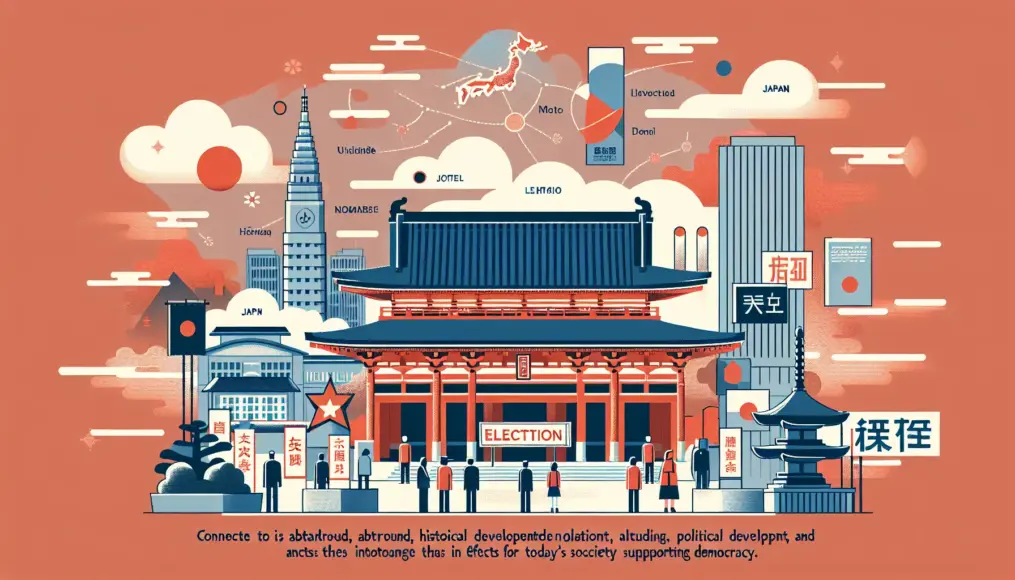Unified local elections play a crucial role in shaping the administration and policy-making of our communities, and their outcomes can lead to significant changes in local society. In today’s world, where the importance of citizen participation—an essential pillar of democracy—is increasingly recognized, the significance of unified local elections has never been more pronounced.
In this blog, we will delve into the history and political significance of unified local elections, exploring their impact on contemporary society. We will also reflect on the necessity for reform in our electoral systems for the next generation, examining how we can participate in elections to help shape the future of our communities.
- A look back at the history and background of unified local elections
- An exploration of the relationship between local governments and democracy
- A discussion on the challenges facing electoral systems for the future
The History and Background of Japan’s Unified Local Elections
Unified local elections play a crucial role in Japan’s local governance system. Since World War II, the electoral framework in Japan has undergone significant transformations. Understanding this evolution helps shed light on how the current unified local elections came to be and the context behind them. A key aspect of this evolution has been the ongoing demand for improvements in the electoral system to ensure the democratic management of local governments.
In this section, we will take a closer look at how unified local elections were introduced through the changes in the electoral system post-war. This will also provide an opportunity to reflect on the purposes and significance of these elections.
Post-War Electoral System Changes
After the war, Japan’s electoral system sought to carve out a new form of democracy. In 1947, a new election law was enacted, establishing the principle of universal suffrage. This guaranteed that all citizens would have equal voting rights, extending this assurance to local government elections as well. Following this, the 1950s saw a growing recognition of the importance of local autonomy, further promoting the conduct of local elections.
The introduction of unified local elections aims to enhance voter turnout and streamline election management by having local governments hold elections simultaneously. This system is designed to ensure that local voices are better represented, ultimately fostering a healthier democracy.
- Japan’s electoral system underwent significant changes after World War II.
- The new election law established in 1947 ensured universal suffrage.
- Unified local elections aim to reflect local voices and strengthen democracy.
Reasons for Introducing Unified Local Elections
The primary motivation for implementing unified local elections was to enhance the transparency and efficiency of local government operations. By conducting local elections simultaneously, costs associated with election management are reduced, easing the burden on citizens participating in the electoral process. Additionally, aligning the timing of elections is expected to boost voter turnout, thereby increasing citizen engagement with local policy decisions.
Moreover, unified local elections provide a vital opportunity for residents’ opinions to be reflected in policy-making. This facilitates the identification of solutions to local issues and allows for the development of better communities. As local governance becomes more dynamic, it is anticipated that residents’ quality of life will improve.
If you are interested in this topic, you might also want to explore the impact of electoral systems on culture. The related article “Exploring the Cultural Impact of Election Campaigns and Political Activities” delves into how election campaigns and political activities have influenced Japanese culture, examining the social changes that underpin the electoral system. Be sure to check it out!
- Unified local elections were introduced to improve transparency and efficiency.
- Simultaneous elections help reduce costs and lighten the burden on citizens.
- They provide a crucial opportunity to reflect residents’ opinions in policy-making.
The Political Significance of Unified Local Elections
Unified local elections are more than just a voting exercise; they represent a crucial system that underpins democracy in local governance. Local governments play a vital role in reflecting the voices of community residents, and the elections serve to strengthen this authority. In this section, we will explore how unified local elections contribute to local governance and democracy, as well as the impacts of the election results.
By participating in unified local elections, citizens have the opportunity to express their opinions and engage in local policymaking. This involvement increases the likelihood that the needs and desires of residents are reflected in policies, ultimately leading to the creation of better communities.
Local Governments and Democracy
Local governments serve as essential arenas for the practice of democracy. By allowing residents to engage directly with local issues, the opinions of the community are more likely to be reflected in policy decisions. Unified local elections are mechanisms that promote this participation, with elected representatives bearing the responsibility of valuing the voices of the community.
Furthermore, when local governments function effectively, residents can partake in decision-making processes that directly impact their lives, embodying the values of democracy. Unified local elections are a crucial means to facilitate this process.
- Local governments are arenas for democratic practice.
- Unified local elections serve as a means to reflect residents’ opinions in policies.
- Participation in elections deepens engagement with local issues.
The Impact of Election Results
Election outcomes have various effects on local communities. The emergence of new leadership can lead to changes in local policies and visions, directly impacting residents’ lives. For instance, new initiatives may be introduced in areas such as education, welfare, and infrastructure development.
Additionally, election results can influence citizens’ awareness. By participating in elections, residents gain a better understanding of their rights and responsibilities, fostering a greater interest in their community. As a result, the entire community can become more vibrant, paving the way for initiatives aimed at a better future.
For those interested in gaining a deeper understanding of the significance of unified local elections, we recommend reading the article “A Simple Explanation of Single-Member Districts and Proportional Representation: Exploring Their Differences and Advantages.” Learning the basics of electoral systems will help you understand how democracy works and how it influences local policies.
- Election results have a direct impact on the local community.
- New leadership may lead to changes in policy.
- Civic awareness increases through election participation, revitalizing the community.
The Impact of Unified Local Elections on Modern Society
In today’s society, unified local elections play a crucial role in fostering citizen participation and easing political tensions. When residents voice their opinions through elections, it raises awareness of local issues and makes it more likely for their views to be reflected in policy decisions. This participatory democracy contributes significantly to revitalizing communities.
Moreover, unified local elections serve as a platform for resolving conflicts and promoting cooperation within the community. By facilitating dialogue among residents with differing opinions, these elections help cultivate mutual understanding, ultimately strengthening community bonds. This section will delve deeper into the impact of unified local elections in contemporary society.
Encouraging Citizen Participation
Unified local elections provide an essential opportunity for citizens to engage in politics. By participating in elections, residents can express their opinions and needs, influencing local policies. This engagement goes beyond just casting a vote; it also serves to raise awareness about community issues.
When citizen participation is encouraged, efforts to address local problems become more dynamic. With residents bringing diverse perspectives to the table, it’s expected that a wider array of viewpoints will be reflected in policymaking, leading to improved community development.
- Unified local elections serve as a platform for encouraging citizen participation
- Opportunities arise for residents’ opinions to influence local policies
- The reflection of diverse perspectives in policies advances community development
Easing Political Tensions
Unified local elections also play a role in alleviating political tensions within the community. By allowing residents with differing political views to exchange opinions, elections create opportunities for mutual understanding. Establishing such dialogues deepens relationships among residents and strengthens cooperative frameworks within the community.
Furthermore, after the election results are announced, both winners and losers are encouraged to consider the future of the community together. This mindset helps to mitigate post-election conflicts, enabling the entire community to unite in tackling challenges. Such processes also contribute to the cultivation of a healthy democracy.
- Unified local elections help ease political tensions
- Mutual understanding emerges when residents with differing views exchange opinions
- A collaborative mindset is nurtured post-election, strengthening cooperative efforts
The Future and Challenges of Unified Local Elections
Unified local elections play a crucial role in supporting democracy at the community level, yet they face numerous challenges ahead. As we move into the future, improving the electoral system will be essential. There is a pressing need to focus on increasing voter turnout and expanding citizen participation. In this chapter, we will explore the necessity for reform in unified local elections and its implications for the next generation.
How the younger generation, which will shape the future of our communities, engages in elections will significantly influence local development. Creating an environment that encourages active political participation among the next generation of citizens will strengthen democracy for years to come.
The Need for Reform
There are several key points to consider when it comes to reforming the unified local election system. First and foremost, initiatives aimed at increasing voter turnout are crucial. With many areas experiencing declining participation, we need creative approaches to make elections more appealing. For example, expanding options for online voting and early voting could enhance convenience and accessibility.
Additionally, education and outreach regarding elections are vital. To empower citizens to understand their rights and engage actively in politics, we must enhance political education. This will likely raise awareness about participating in elections and spark greater interest in local policies.
- Initiatives to boost voter turnout are essential
- Expanding online voting and early voting could be beneficial
- Enhanced political education will foster civic engagement
Impact on the Next Generation
In the coming years, unified local elections will significantly influence the formation of local communities. When young people participate in politics, they bring fresh perspectives and ideas, paving the way for innovative solutions to local challenges. Moreover, by engaging in elections, youth will develop a sense of responsibility and awareness regarding the future of their communities.
Furthermore, active involvement in elections by the next generation will strengthen community ties and energize the entire locality. This could lead to sustainable development in the region and contribute to creating a better society for all.
- Participation from the next generation brings new perspectives and ideas
- Youth engagement in elections cultivates responsibility and awareness
- Community revitalization leads to sustainable development
Conclusion
Unified local elections are a vital system that supports regional democracy, fostering citizen participation and easing political tensions. Throughout this article, we’ve explored the evolution of the electoral system since World War II, the reasons behind the introduction of unified local elections, and their political significance and impact in contemporary society. It has been reaffirmed that elections serve as a crucial opportunity for community members to express their opinions and shape the future of their neighborhoods.
Looking ahead, there is a call for improvements in the unified local election system, and it’s expected that the active involvement of the next generation of citizens will contribute to the development of our communities. When each citizen engages in politics, the realization of a better society becomes possible.
- Unified local elections are a system that supports regional democracy
- They contribute to promoting citizen participation and easing political tensions
- The involvement of the next generation is a key factor in shaping the future of our communities
Let’s continue to stay engaged with elections to make our communities better. We’d love to hear your thoughts and feedback in the comments!



Comment